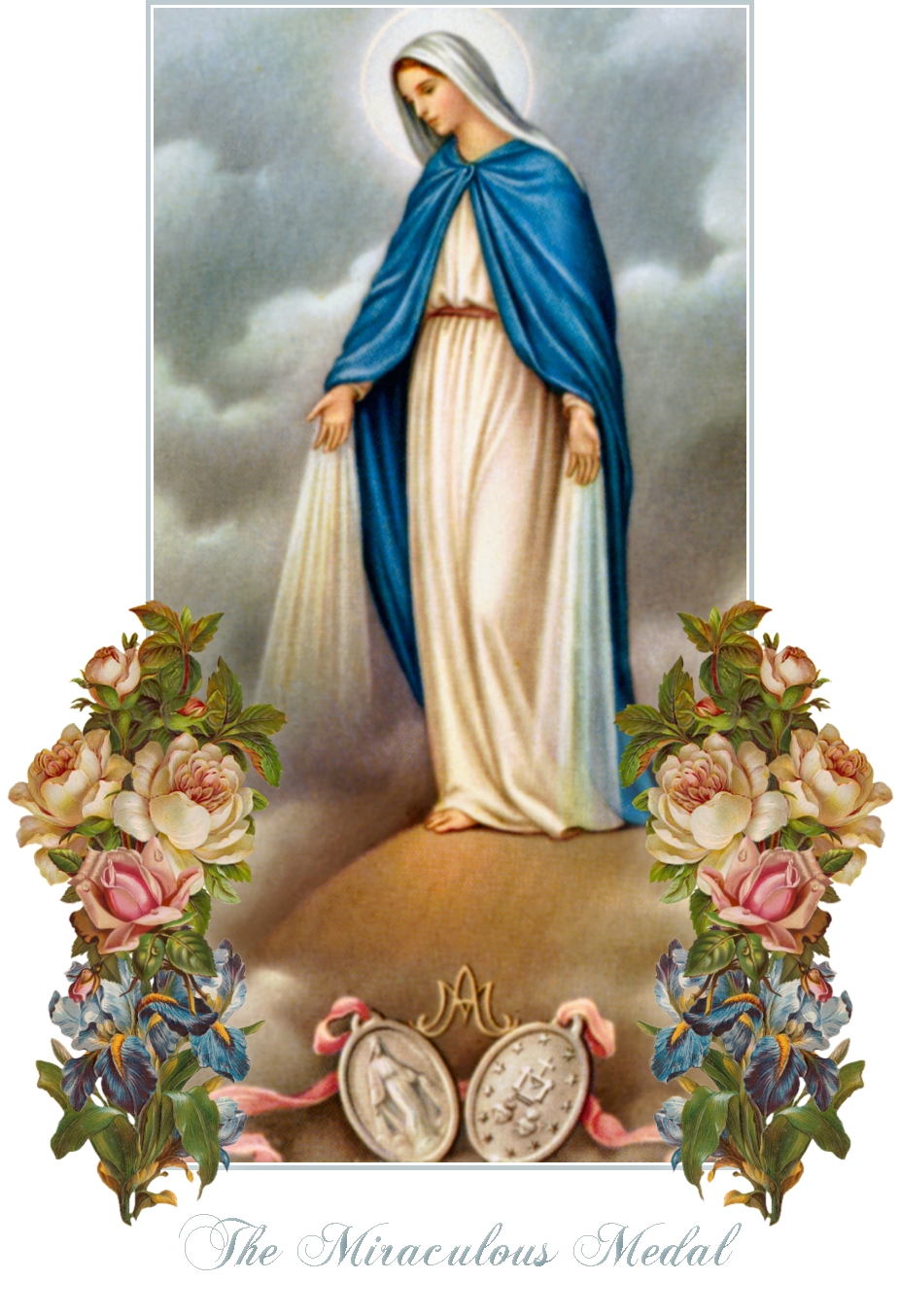
The Miraculous Medal
Page 1
The Miraculous Medal is a physical manifestation of the gift of grace that perpetually exudes from Our Lady and it, too, is a Sacramental, a most miraculous one. It was originally called the Medal of the Immaculate Conception, but because so many miracles were reported by those wearing it that it became known as the Miraculous Medal. Often the Medal is presented to Catholics who are making their first holy Communion, receiving the Sacrament of Confirmation and given at Baptisms. The Blessed Virgin Mary declared that those who wear it around their necks will be given wondrous graces, among them, not sinking into a life of iniquity or becoming more pure.
THE STORY OF THE MIRACULOUS MEDAL
This is a very brief version. To obtain the beautiful booklet, MARY'S MIRACULOUS MEDAL, with lovely images, especially good for children to peruse, go HERE. This booklet also has the conversion story of Ratisbonne and the perpetual Novena. The above image is not part of the booklet, but there are many in it and all as lovely, including the cover.
In 1830, one of the apparitions sanctioned by Holy Mother Church occurred in the chapel of the Daughters of Charity of St. Vincent de Paul, the Rue de Bac, Paris. There were three visions given to Saint Catherine Laboure who, at the time of the first one, was a novice in the order. We have an image of her, HERE.
She was awakened at 11:30 PM on the eve of the Feast of St. Vincent de Paul, by a "shining child" who led her to the chapel where she saw Our Lady, who spoke to her for two hours about the difficult task that lay ahead. Four months later, on November 27 Catherine had the second vision wherein she saw a three-dimensional scene of the Blessed Virgin standing on a white globe with dazzling rays of light streaming from her fingers and she heard a voice say:
"These are the symbols of grace I shed upon those who ask for them." A frame formed around the Mother of God and within it was written in gold letters, O Mary, conceived without sin, pray for us who have recourse to thee."
The voice then told her to have a medal struck after this model. Then the vision turned and on the reverse side was a large M with a bar through it and a cross over it. Beneath this M were the Hearts of Jesus and Mary, one crowned with thorns and the other pierced by a sword.
This second vision occurred periodically until 1831. Because she wanted to remain unknown, Catherine told them only to her confessor. Msgr. Aladel, who received permission from the Archbishop of Paris to have the medal struck. The first 1500 were issued in June of 1832, and almost at once there were reported healings, conversions and miraculous events. The Saint could not be convinced to appear at any of the canonical hearings, but eventually the apparition of the Blessed Virgin Mary was sanctioned on the overwhelming evidence of the miracles obtained by those wearing the medal. Saint Catherine Laboure only revealed herself as the visionary eight months before her death, in 1876. Like St. Therese of Lisieux, this came as a surprise to the other nuns as they considered her quite ordinary. She was canonized in 1947 by Ven. Pope Pius XII. Her Feast is November 27 as is the Feast of the Miraculous Medal, although in some places it is celebrated on December 8, the Feast of the Immaculate Conception because of its relation to it.
We have related that this medal is the impetus to conversion for those who wear it or have it in their possession. Here is just one:
THE CONVERSION OF AN UNBAPTIZED PATIENT IN ST. LOUIS, MISSOURI
A patient brought to the hospital in a hopeless condition, openly manifested his hatred of Catholicity. Yet, as he was in imminent danger of death, the Sister, profiting by a moment in which he seemed a little better disposed than usual, ventured to ask him if he would be Baptized. He answered roughly, No, that he scarcely believed in Baptism, and not at all in Catholic Baptism, that in case of his recovery, perhaps he would receive Baptism by immersion, and become a member of some church, but that would never be the Catholic Church. At any rate, added he, I am not going to torment myself now about such things.
The poor Sister having no other recourse than the Blessed Virgin, and seeing that the young man approached his end, stealthily slipped a medal under his pillow. Next morning it was picked up by the infirmarian, who, thinking the Sister had dropped it accidentally, was about to return it, but the patient opposed him. The little image pleased his fancy, and he wanted to keep it himself. To quiet him, the infirmarian was obliged to ask Sister if the patient might have it. The request was granted.
Towards evening someone came to the Sister with a message from the patient. He wished to see her. Sister, said he, as soon as she approached, you have told me I could not be saved without Baptism.
Filled with joy at this news she began to instruct and prepare him for the ceremony. It took place next morning, and during the course of the day this soul, now the child of God, went to repose in the bosom of its celestial Father to bless and thank Him for all eternity for His mercies.

